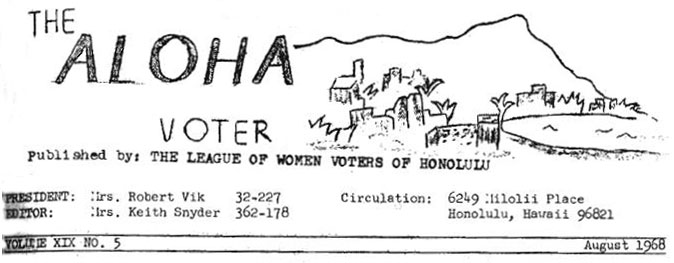 June-July 1968
June-July 1968August 1968
 September 1968
September 1968 June-July 1968 June-July 1968 |
Home
Newsletters
August 1968 |  September 1968 September 1968 |

 Coming Events Coming Events Your Vote Makes a Difference (Betty Tobiasson) Your Vote Makes a Difference (Betty Tobiasson) From the President - Report of the 28th National Convention (Elaine Vik) From the President - Report of the 28th National Convention (Elaine Vik) Taking Action - Human Resources Taking Action - Human Resources Open Housing Law Enacted by Congress Open Housing Law Enacted by Congress Application for Membership in the LWV-US Application for Membership in the LWV-US LWV Forum - Meet the Candidates for Mayor (insert) LWV Forum - Meet the Candidates for Mayor (insert) |
|
Human Resources League of Women Voters of the U.S.
OPEN HOUSING LAW ENACTED BY CONGRESS On April 11, the President signed into law a landmark civil rights bill (P.L. 90-284). When the second Session of the 90th Congress convened in January, 1968, few in or out of Congress expected passage of a far-reaching open-housing bill in 1968. The pending business of the Senate, when it convened in January, was a House-passed bill (H.R. 2516) protecting civil rights workers. After weeks of floor debate, filibustering and compromises, the Senate on March 11 by a 71-20 roll call vote approved the House-passed bill which now included a strong open housing provision. The bill was then sent back to the House, and another month of efforts by the proponents of the bill ensued. The House finally on April 10, accepted the Senate version of the bill by a 250-172 roll call vote. The next day the President signed the bill into law. Housing Provision in the New Law (1) When fully in effect (January 1, 1970) the bill will prohibit discrimination in the sale or rental of about 80 percent of all housing in the United States. The provisions in the bill come into effect in three stages, and will apply:
Administration: The housing provision of P.L. 90-284 will be administered by the Secretary of Housing and Urban Development (provision for a new Assistant Secretary was included). HUD will have the responsibilities for research, education, and technical assistance to reduce discriminatory housing practices. Enforcement: The law provides that a person who thinks he has been discriminated against can file a complaint with the Secretary of HUD, which the Secretary is required to investigate and can attempt to conciliate. If conciliation fails the person can sue in a federal court for injunctive relief. State or local remedies, where available, must be sought before federal action is taken The law also provides that a person can sue in federal, state or local courts for relief or damages without filing a complaint with the Department of HUD. The burden of proof of discrimination will be on the person making the complaint. The U.S. Attorney General can bring a civil suit where there is a pattern of discrimination of public importance. INTERFERENCE WITH SALES OR RENTALS: The law provides criminal penalties for injuring, intimidation or interfering with any person, or attempting to injure, intimidate or interfere with any person:
(1) Compiled from the CONGRESSIONAL QUARTERLY (2) On November 20, 1962, President Kennedy, signed an executive order prohibiting discrimination in housing built, purchased, or financed with federal assistance. The order took effect immediately. The order covered federally-owned or operated housing, public housing and housing in urban renewal projects subsidized by the Federal Government; housing constructed with federal loans, such as housing for the elderly, community facilities and college housing; housing developments and apartments insured by the Federal Housing Administration or Veterans Administration. It also covered secondary mortgaging of FHA and VA mortgages by the Federal National Mortgage Association. LWV SUPPORT POSITION - HUMAN RESOURCES: Support of equality of opportunity for education, employment, and housing. Evaluation of means to achieve equality of opportunity for housing and of further measures to combat poverty and discrimination, (As amended by the Convention) Support of equal opportunity for housing means that the League believer that all persons should have the same rights to buy or rent dwellings regardless of race, color, sex, religion, or national origin. It means, further, that the League believes these rights should be secured by law, -Distributed by the LWV of Honolulu - August 1968
|
 June-July 1968 June-July 1968 | Top Home Newsletters |  September 1968 September 1968 |